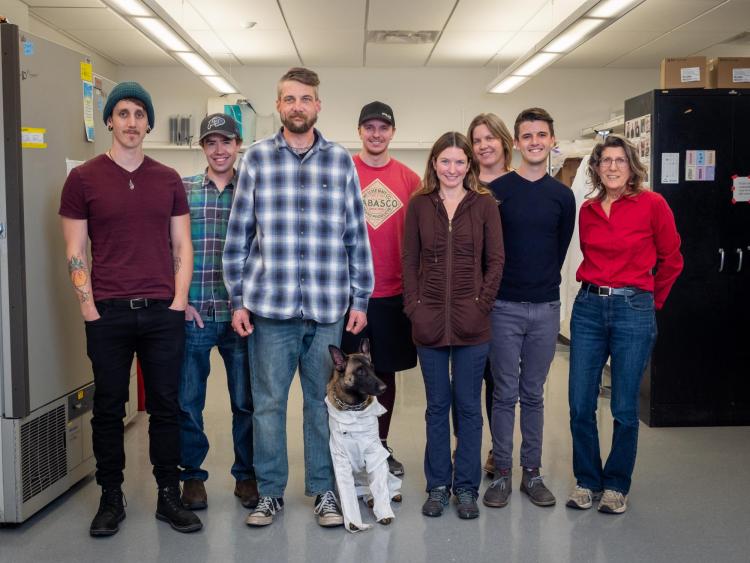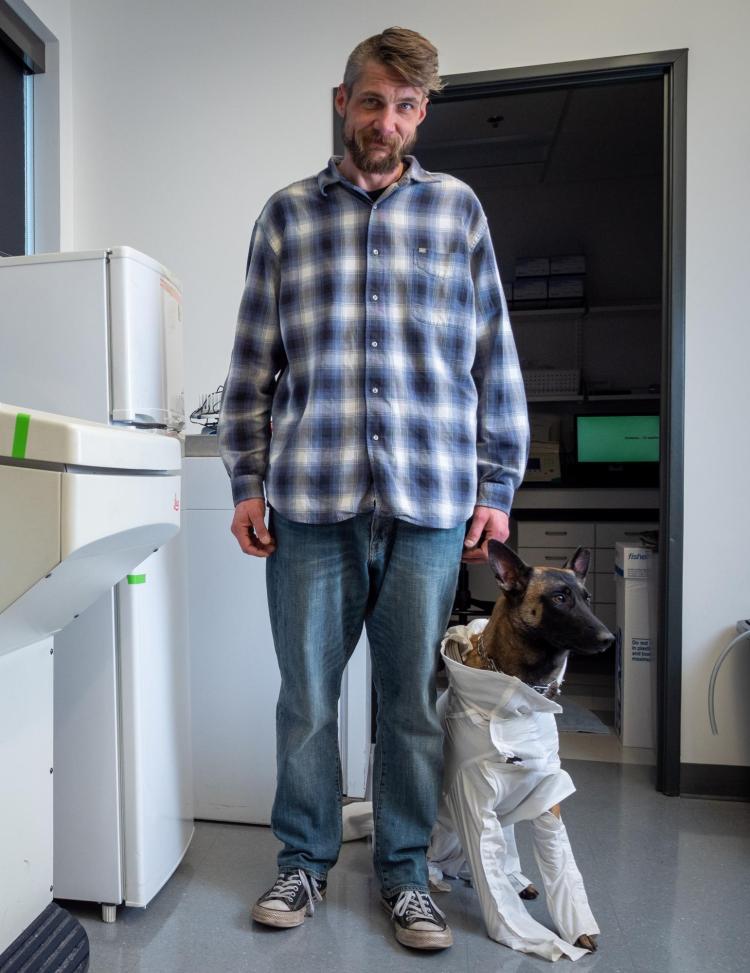Xenna the service dog helps Navy vet do laboratory research
Along the way, both of them, with help from CU Boulder, pave the way for greater accessibility
Canine support companions help people with disabilities succeed in many environments, and at the University of Colorado Boulder, a service dog is enabling a wounded military veteran to pursue his dream of hands-on research in neuroscience.
Xenna is a service dog for Navy veteran Jon Coulson. The 1 ½-year-old dog with a sable-colored coat helps Coulson manage his severe pain and anxiety. She will soon be allowed in neuroscience labs at CU Boulder, paving the way for service dogs in the future.
Coulson is a senior with a double major in neuroscience and molecular, cellular and developmental biology who works in the neuroscience lab of Distinguished Professor Linda Watkins.
“People with service animals have typically shied away from a STEM (science, technology, engineering and mathematics) degree because of potentially dangerous lab environments,” Coulson said. “But a STEM environment is why I decided to come to CU. I want to solve the (accessibility) problem or at least have a hand in it.”
There are times just the sheer pain makes me want to isolate and not have any interaction with people,” he said. “Having Xenna in the lab with me means everything to me.”
Xenna became Coulson’s service dog a year ago when she was six months old. She is a second generation Shepinois (a Belgian Malinois and German Shepherd mix). Wherever Coulson goes, Xenna is by his side, providing constant emotional support. She is trained to call Coulson’s attention to signs of an imminent seizure or a rise in his anxiety by nudging his leg or touching his foot with her paw.
The idea that Coulson might have to be separated from her while working in the labs was unthinkable.
“There are times just the sheer pain makes me want to isolate and not have any interaction with people,” he said. “Having Xenna in the lab with me means everything to me.”
To be able to stay together in chemistry and neuroscience labs, Coulson and Xenna went through specialized training. Xenna had to learn to stay still and quiet, since sudden barking could startle researchers, causing them to drop chemicals they might be working with.
“Xenna is paving the way for others,” Coulson said. “A lot of people who have disabilities that require a service animal are often eliminated from the possibility of pursuing a lab environment. Dr. Watkins and her team have welcomed us with open arms. It’s about changing the culture to accept us into the environment.”

Navy veteran Jon Coulson (center) with his service dog, Xenna, along with Linda Watkins (far right) and the laboratory research team at the University of Colorado Boulder. Note: Xenna is appropriately dressed for the neuroscience research lab. CU Boulder Photos by Patrick Campbell.
In 2010, Coulson injured his back on an overseas mission. The injury caused an almost total paralysis of his left leg that is only partly relieved.
He has seizures and neuro-disabilities. He also has Ankylosing spondylitis (AS), a rare type of arthritis that causes pain and stiffness in his spine, which is causing some vertebrae to fuse. Changes in temperature and barometric pressure exacerbate the pain. The Veterans Administration considers him to be 100% disabled.
After leaving the Navy in 2012, Coulson got a job with Concur, a travel and expense management company coding software. When sitting for hours working at a computer exacerbated his back and leg injuries, Coulson’s doctor advised him to change careers. Wanting to understand his disabilities, Coulson enrolled at the University of Mississippi. In 2018, he transferred to CU Boulder for the neuroscience program.
While taking Watkins’ introductory neuroscience class, Coulson became interested in her research and asked to join her research group, which works to develop novel therapies for pain. He was particularly excited about Watkins’ work on chronic pain in dogs with osteoarthritis and how her research team’s new therapeutic approach was having positive results.

Xenna, a service dog, in her lab-approved protective gear standing next to her owner, Navy veteran Jon Coulson. Note: Xenna is appropriately dressed for the neuroscience research lab.
To join Watkins’ research group, Coulson and Xenna went through an approval process with the building manager and campus veterinarian to determine where the service dog could and could not go in the labs. For Xenna to be with Coulson in the lab for general chemistry and organic chemistry courses, she has to wear a specially made lab coat that covers her from head to tail, special booties and eye protection (dog goggles).
During Xenna’s initial training, Coulson worked outside the research lab in the “people area” of the building. He helped enter and analyze canine chronic pain data from their studies of a new therapeutic for osteoarthritis in dogs, leading to his upcoming co-authorship on a manuscript.
He also worked with data on a project testing efficacy of oral CBD (cannabidiol) in a pilot study for dogs in pain. Coulson will also help with a project on canine atopic dermatitis that’s about to begin.
Now that Xenna is set up for accompanying Coulson into the tissue analysis (“wet” lab) areas, Coulson is training on rodent tissue preparation assay and photomicrographic analysis involving him in several ongoing projects in the lab.
“We’re grateful to the chemistry department,” Watkins said, “as they—for good reasons given what the labs involve—required Jon to have protections for Xenna.”
Since Watkins’ grant-funded neuroscience research lab is not a course lab like general and organic chemistry, Xenna isn’t in danger from the chemicals used in those labs. And since her fur could contaminate various tests that take place, the lab coat also helps to minimize dog hair in neuroscience labs.
The nature of general and organic chemistry labs is quite different from neuroscience labs; hazards in chemistry labs include toxic chemicals, potential glass breakage, possible spills and greater numbers of people. When Xenna is in those labs, greater personal protective equipment is required for her.
She also has a bed where she can rest and still stay near Coulson while he’s working.
Thanks to the accommodations made for Xenna, she will remain at Coulson’s side as he earns his bachelor’s degree.
“Xenna is such a benefit to me because she can tell me if I’m about to have a seizure,” Coulson said.
“Chronic pain and the mental health challenges it poses, coupled with a lack of a solution, becomes a bleak existence. The work that Dr. Watkins’ team has been advancing is incredible and has completely changed my outlook on life.”

